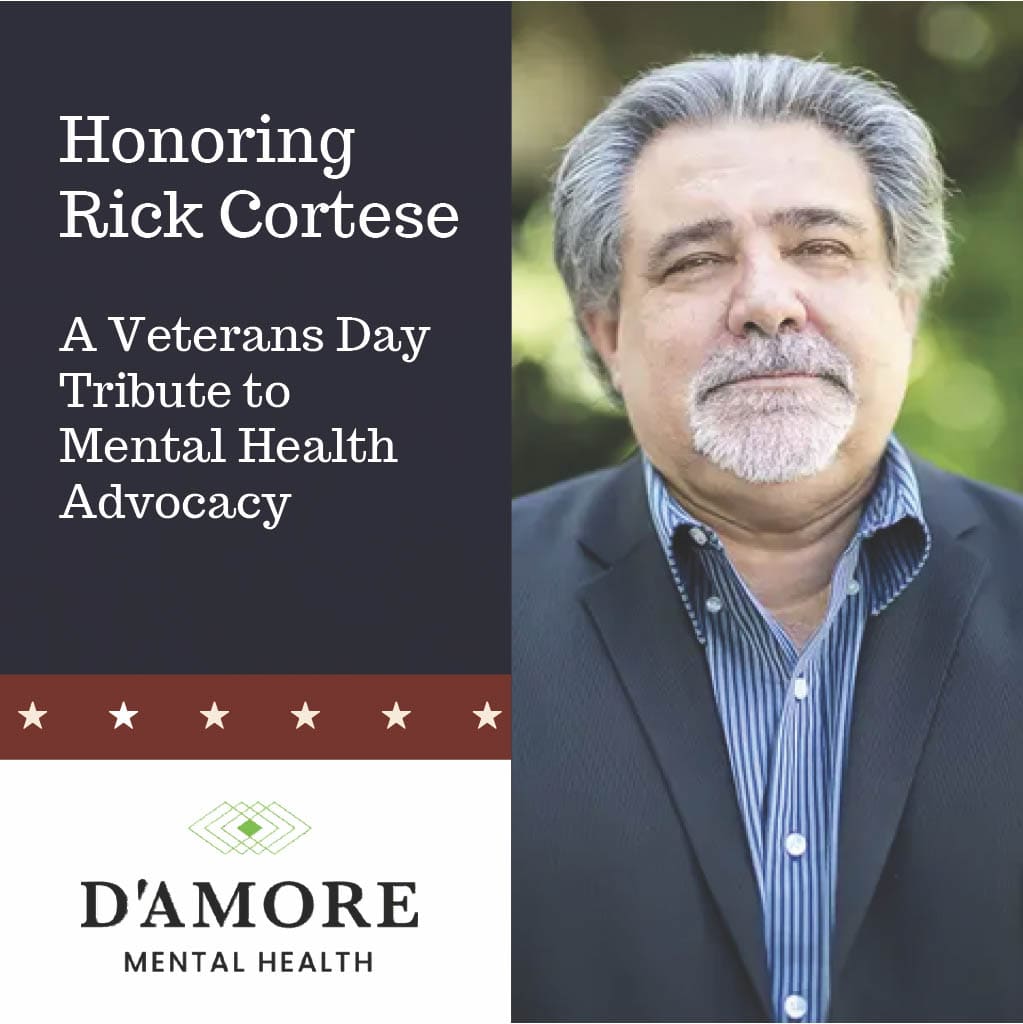On Veterans Day, we honor the bravery and sacrifice of those who have served our country. It’s also a day to acknowledge the battles that continue beyond the battlefield, particularly the mental health struggles that many veterans face. This year, we reflect on the story of Rick Cortese, a valiant Marine, a Purple Heart recipient, an ardent advocate for veterans’ mental health, and a co-founder of D’Amore.
Rick joined the Marine Corps in 1969 during the Vietnam War. During combat, Rick suffered an injury that earned him the Purple Heart but also left him with deep scars, both physical and psychological. Like so many of his brothers-in-arms, Rick’s battle didn’t end upon leaving Vietnam; he faced a lifelong struggle with PTSD.
Despite the challenges, Rick forged a path of resilience and success. He built a loving family with his wife and raised two beautiful daughters, creating a life filled with love and joy. The other members of his platoon remained a steadfast support network as they attended reunions and stood by each other through thick and thin. Rick’s commitment to his fellow veterans extended to volunteering at the VA, offering his time and empathy to those walking a path he knew all too well.
In retirement, while enjoying the success of his hard-earned endeavors, Rick felt a persistent call to give back. This longing led to the founding of D’Amore, alongside his colleague John Emma, with a vision to assist individuals struggling with mental health disorders.
Rick’s journey was not without its trials, but he was a “man with the golden touch,” thriving in his endeavors and deeply aware of his blessings. His ultimate dream was to extend that golden touch to his fellow veterans, ensuring they received the support and care they deserved.
Sadly, Rick’s time was cut short by a progressive neurodegenerative disease related to his service, Amyotrophic Lateral Sclerosis (ALS). Yet, his spirit continues to guide the organization. As D’Amore grows, it carries Rick’s legacy forward, maintaining his commitment to helping people face mental health challenges.
On this Veterans Day, let’s honor Rick’s memory and the countless other veterans who, like him, have battled mental health issues. Let’s commit to understanding their needs, sharing their stories, and working towards a system that supports their mental health as steadfastly as they defend our nation.
In remembering Rick, we are reminded that our gratitude to our veterans should not only be expressed in words but also in actions. To all our veterans, we owe a debt that can never truly be repaid. Today and every day, we say thank you. Your service matters, your health matters, and your life beyond the uniform matters. On this solemn day, we stand with you in solidarity for the peace and recovery you have earned.
The Prevalence of Mental Health Issues Among Veterans
As we remember the sacrifices and valor of veterans like Rick Cortese this Veterans Day, it’s crucial to shine a light on the mental health challenges many of our veterans face. The statistics are a stark reminder of the toll that service can take on our servicemen and women’s mental well-being.
Research shows that approximately 14% to 16% of U.S. service members deployed to Afghanistan and Iraq have been impacted by PTSD or depression. These conditions are not just numbers; they represent real struggles that affect veterans’ daily lives, relationships, and ability to integrate back into civilian life.
The United States is home to about 18 million veterans and 2.1 million active-duty and reserve service members. Each of these individuals carries a unique set of experiences and, for many, a heavy psychological burden. Depression, often overshadowed by the more frequently discussed PTSD, accounts for up to 9% of all ambulatory military health network appointments, with a notable increase in diagnosed cases following deployments.
Tragically, the mental health crisis among veterans is underscored by the alarming rate of suicide. Over 6000 veterans die by suicide annually, and veteran suicide rates are 1.5 times higher than those of non-veterans. This statistic is a heart-wrenching reminder of the critical importance of mental health support for our veterans.
Substance Use Disorders (SUDs) are another significant concern in this community. Approximately 30% of completed suicides among military personnel involve alcohol or drug use, highlighting the need for comprehensive mental health and substance abuse treatment services.
Rick Cortese’s story, and those of many veterans like him underscore the vital need for awareness, support, and accessible care for our veterans. As we honor their service, let us also commit to understanding and addressing the mental health challenges they face. Our veterans have bravely served our nation, and it’s our duty to ensure they receive the mental health support and care they deserve in return.
In honoring their service, we must remember that our veterans’ battles may not end when they return home. On this Veterans Day, let’s recommit ourselves to supporting their mental health with as much fervor as they served our nation.
Support Services Available for Veterans
Recognizing the unique mental health challenges faced by veterans, there are dedicated support services available to assist. If you’re a veteran experiencing a crisis or if you’re concerned about a fellow veteran, know that immediate assistance is accessible.
These services are in partnership with the Veterans Crisis Line, connecting you with compassionate, qualified professionals, including many who have served in the military themselves. They understand the nuances of transitioning from military to civilian life and are trained to provide empathetic support. Here’s how you can reach out:
- Phone: By dialing 988 and pressing 1, you’ll be connected to a VA-trained responder through the Veterans Crisis Line.
- Text Message: For confidential assistance, text 838255.
- Confidential Chat: Engage in a private chat with a VA professional via the Veterans Crisis Line website.
- TTY Service: Veterans with hearing loss can call 800-799-4889 for TTY service.
On Veterans Day and every day, we honor the service of our veterans and acknowledge the strength it takes to seek help. It’s a reminder that reaching out for support is an act of bravery. Veterans are encouraged to utilize these resources whenever needed, with guidance and assistance available through each step of finding the help they deserve.





































